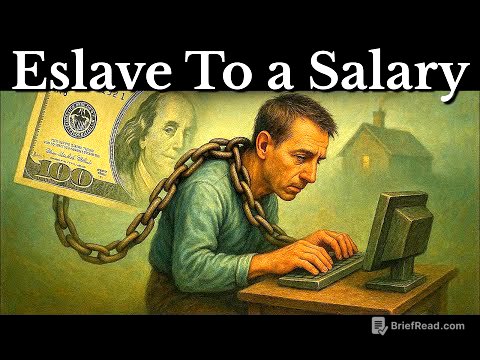TLDR;
This video provides a comprehensive overview of the global financial landscape, focusing on trade tensions between the EU and the US, the implications of the Japanese election results, and the performance of European stocks and banks. It also highlights key economic events and data releases to watch in the coming week, including the ECB meeting and earnings reports from major companies.
- Trade tensions between the EU and the US are a major concern, with potential tariffs looming.
- The Japanese election results have implications for the country's economic policy and the Bank of Japan's actions.
- European stocks are relatively flat, with the FTSE 100 outperforming.
- The ECB is expected to hold rates steady at its upcoming meeting.
- Several major companies, including Stellantis and Ryanair, have released earnings reports.
The Opening Trade [0:00]
The hosts preview the day's key topics, including complicated trade talks between the EU and the US, interviews with the CEOs of Deutsche Bank and Siemens regarding their investment plans in Germany, and the upcoming ECB meeting. They note that European stocks declined on Friday, while US stocks remain near record highs. The hosts also express interest in seeing how the market reacts to the Yen.
Japan Election Results [0:13]
The discussion covers the recent Japanese election results, where Ishiba's party lost seats in both houses. This raises questions about the potential weakening of Japan's position in trade negotiations and whether it might lead to increased government spending. The hosts also discuss the possibility of the Bank of Japan raising rates in response to inflation and the overall uncertainty in the market.
EU-US Trade War [2:11]
The EU is preparing for a potential "no deal" scenario with the US regarding trade. Retaliation is one option, but there are divisions within the EU on how to proceed. Some members may accept higher tariffs with exemptions, but it seems unlikely that everyone will get the carve-outs they want. The US is aware of the EU's potential responses, including the "anti-coercion tool."
Japanese Yen [5:17]
The discussion shifts to the Japanese Yen and how the bond market in Japan will respond to potential higher government spending and whether the BOJ will raise rates. The populace is annoyed and the rice story is making headlines, so what is the effect and does Japan need a moment before the trade deal to understand what it could mean? There is uncertainty in the market, and buying the Yen feels counter-intuitive, but that's what markets are doing.
Israel Attack on Deir Al-Balah [9:41]
Israel warned it will move into a town in the heart of Gaza. The military told Palestinians to evacuate to the South and a total of almost 1000 Palestinians have been killed waiting for aid including 67 people yesterday.
China Block US Worker Exit [10:37]
The Washington Post reports that a Chinese-American employee of the Commerce Department of the U.S. is barred from leaving China since April. He was detained when he arrived in Chengdu. The man is being held because his case is linked to harmful actions.
Alaska Airlines [10:44]
The Alaska Air ground stop has been canceled after a temporary grounding of all planes. It is the second time in just over one year Alaska Air has had to ground their fleet.
Stellantis Stock [12:36]
Stellantis released earnings, suspending guidance and trying to address a gap in expectations. The net pre-tax charge they are taking is substantial and will impact expectations. The market anticipated a profit and is now anticipating a loss, so we will see how the market reacts, but it looks like a gap.
Japan PM Ishiba to Stay [16:06]
The LDP loses its majority without a big reaction. Ishiba is saying he wants to stay in power, but still, we don't know how the rest of the LDP leaders will react, so market is trying to extract info on how it will go and the Yen weakened before the election -- maybe the market expected the worst. People are upset with inflation, could that impede the BOJ's path to raise rates? It could force the BOJ to hike rates. The market is looking at the BOJ as too late in the cycle.
German Firms Pledge Massive Investment [26:22]
More than 60 German companies have pledged to invest over 600 billion euros in Germany to stimulate growth and competition. This initiative aims to address structural changes and leverage Germany's potential in areas like AI, sustainability, and technology. The focus is on innovation, labor market improvements, and creating a better investment climate with less regulation and faster decisions.
Siemens CEO [28:41]
Siemens is investing in manufacturing and innovation, driving digitalization. They are deploying capital in Berlin to create a fully digital environment for living and working. The company emphasizes the importance of data and know-how, combined with AI, to transform Germany into a tech-led country. Sustainability and defense are also key areas for future development.
Deutsche Bank CEO [36:37]
Deutsche Bank aims to be a capable global European player, providing an alternative to US banks in a world of geopolitical uncertainties. The bank sees an opportunity to contribute to client growth around the world and emphasizes the importance of diversification in banking. Investors are showing increased interest in Europe, and Deutsche Bank wants to facilitate and contribute to client growth around the world.
FTSE 100 Check [44:32]
The FTSE 100 is flat, showing little movement despite potential risks. The market seems unfazed by upcoming events and potential catalysts. There is a discussion about whether the market is underestimating the potential impact of tariffs and other risks.
Stocks to Watch: Stellantis, RyanAir, Carrefour [47:34]
Stellantis recorded a net loss of 2.3 million euros in the first half, contrary to analysts' expectations of a profit. This is attributed to restructuring and the impact of tariffs. Ryanair, on the other hand, is reporting positive results, with things moving in the right direction. Carrefour is working with Rothschild on M&A activity.
RyanAir Profit Doubles [1:04:50]
Ryanair's net income more than doubled due to strong travel demand and easing aircraft delivery delays. The airline is benefiting from shorter trips and cost control measures. Analysts have a favorable outlook for the company, with potential upside for the year. Ryanair's CFO stated that any tariffs would be on Boeing's account, not theirs.
EU Tariff Retaliation [1:12:46]
As the August 1 tariff deadline approaches, the European Union is looking to formulate a plan for measures to respond to a possible no deal scenario with the U.S. The U.S. seems to want a near universal tariff on goods, higher than 10%. The Europeans have a big choice to make: escalate, or accept unfair negotiation and take the economic pain?
Bitcoin, Stablecoin [1:23:43]
There is now this moment where we are in a different colt situation where we don't want the Euro to be too strong. There is something here about building an alternative to the dollar as the dollar erodes in the Euro becomes a currency were emerging markets want to issue it, or a currency where the financing of the defense efforts want to be. Europe needs to have an alternative to stablecoins.
European Banks Earnings [1:30:29]
European banks are a big sector to watch, affected by interest rate cuts and geopolitical tensions. The key thing to look out for this earnings season is all those banks come through in the second quarter is likely to be less resilient than the first. Things are starting to catch up. The interest rate cuts are starting to feed through to lower net interest. The tariffs and the uncertainty is feeding through the cost of risk and into higher provisions as well.









